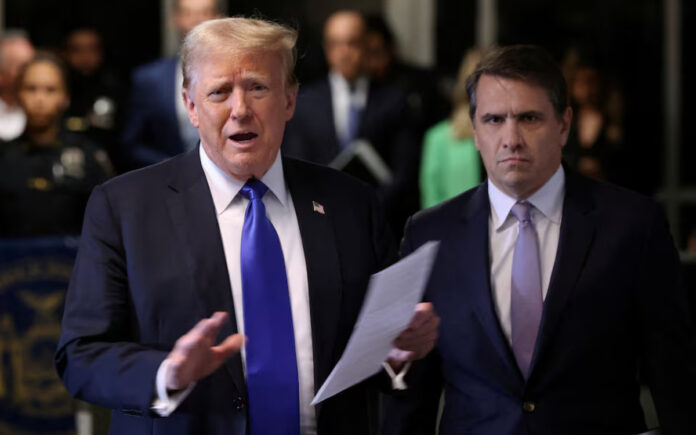Washington: Donald Trump on Monday lost his motion to overturn his criminal conviction related to hush money payments, following the U.S. Supreme Court’s July ruling that presidents are immune from prosecution for official acts. The decision by Justice Juan Merchan in New York state court represents a significant setback for Trump, as it blocks one legal avenue to remove the criminal conviction ahead of his return to the White House on January 20 for his second term.
Trump’s legal team is pursuing additional efforts to overturn the verdict, including a separate motion still pending before Justice Merchan, after Trump defeated Democratic Vice President Kamala Harris in the November 5 election.
Court Rejects Trump’s Immunity Claim
In a 41-page decision, Justice Merchan ruled in favor of the Manhattan District Attorney’s office, which brought the case under the leadership of Alvin Bragg. Prosecutors maintained that the case centered on Trump’s personal conduct rather than any official presidential acts.
Merchan emphasized that Trump’s prosecution for “decidedly personal acts of falsifying business records poses no danger of intrusion on the authority and function of the executive branch.”
Trump spokesperson Steven Cheung condemned the decision, calling it “a direct violation of the Supreme Court’s decision on immunity.”
Details of the Case
The conviction stems from a $130,000 payment made by Trump’s former lawyer, Michael Cohen, to adult film actor Stormy Daniels prior to the 2016 election. The payment was intended to ensure Daniels’ silence about an alleged sexual encounter with Trump a decade earlier—an encounter Trump has consistently denied.
In May, a Manhattan jury found Trump guilty on 34 counts of falsifying business records to cover up the payment, marking the first time in U.S. history that a president—sitting or former—had been charged or convicted of a criminal offense. Trump pleaded not guilty and characterized the case as a politically motivated attempt by Bragg, a Democrat, to damage his 2024 campaign.
Supreme Court and Presidential Immunity
The Supreme Court’s ruling earlier this year established that presidents are immune from prosecution for official acts and that evidence of those acts cannot be used in trials involving personal conduct. Trump’s lawyers argued that prosecutors improperly presented evidence, including his social media posts as president and testimony from aides regarding conversations in the White House.
However, prosecutors countered that the case focused solely on “wholly unofficial conduct” and noted that the Supreme Court had explicitly stated there is no immunity for a president’s unofficial actions.
Other Criminal Cases Against Trump
The hush money case is the only one of four criminal cases brought against Trump in 2023 to reach trial. Other cases include:
- Federal charges over efforts to overturn the 2020 election results and mishandling of classified documents. Both have been dismissed under the Department of Justice policy that presidents cannot face federal prosecution.
- Georgia state court charges related to Trump’s attempts to reverse the 2020 election outcome, which remain unresolved.
Trump has pleaded not guilty in all cases.
Also Read | US Senate Advances $895 Billion Defense Bill Amid Transgender Care Debate
Trump’s Efforts to Dismiss the Charges
Trump was initially scheduled for sentencing on November 26, but Justice Merchan postponed the date indefinitely following Trump’s election victory. Trump’s attorneys argue that the conviction would impair his ability to govern as president, urging the court to dismiss the charges altogether.
Also Read | Mass Grave Outside Damascus Could Contain 100,000 Bodies, Syrian Advocate Claims
Manhattan District Attorney Bragg’s office rejected Trump’s appeal for dismissal, stating that overturning the jury’s verdict would be an “extreme remedy”. They suggested alternative measures could address Trump’s concerns without undermining the legal process.
Awaiting the Court’s Ruling
Justice Merchan has not indicated when he will rule on Trump’s remaining motion.



